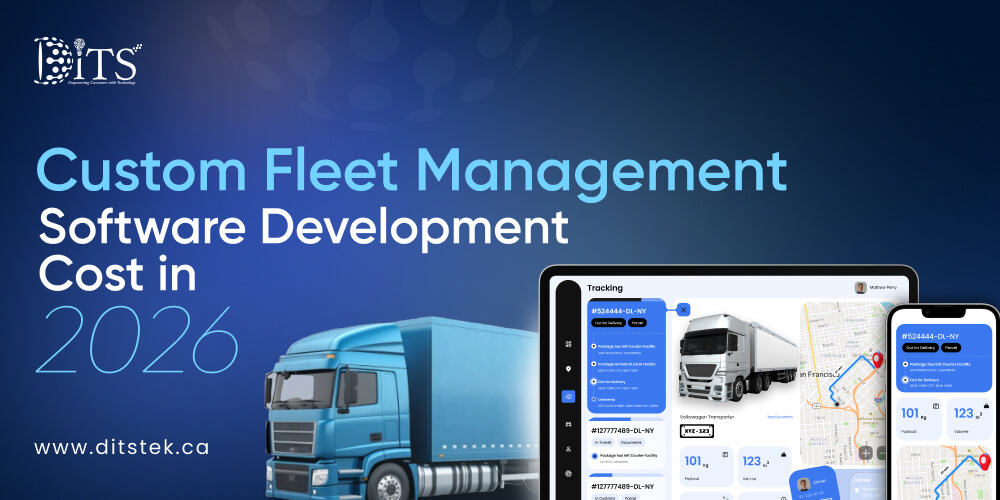Custom Fleet Management Software Development Cost in 2026
Ditstek Blogs
As businesses expand, they will need to add more vehicles to their fleet, making fleet management more complex. It also becomes more challenging to make decisions about their fleet, especially with rising fuel prices week to week, unplanned downtime, and delays in vehicle productivity. This is where the fleet management software offers the ultimate solution. Fleet management software enables organizations to monitor operations in real time, minimize risks, and make data-driven decisions.
For businesses in Canada looking to implement a fleet management solution, understanding the cost of fleet management software development is essential, as every company needs to know how much to invest. The average cost of fleet management software development ranges from $30,000 to $45,000 for basic features. However, for mid- and enterprise-level software, the price can range from $45,000 to $150,000.
The software cost is directly related to the value, savings, and continued growth that their software solution will facilitate. This blog will review what influences the overall price, which features account for costs, and how to make the best cost-benefit decision for an organization's budget and business needs.
What is Fleet Management Software?
Fleet management software is a digital platform that helps companies manage and optimize vehicle use. A company can now have everything related to the fleet in one system; it no longer needs to rely on manual tracking or separate tools.
It is amazing to see businesses in Canada using fleet management software to track vehicles' real-time locations, monitor fuel usage, optimize driving routes, and schedule maintenance. In addition, it helps keep costs in check, improve compliance, and protect drivers. Whether in logistics, construction, or rental, the need for fleet management software is universal.
Fleet management software simplifies an organization’s daily fleet operations. It sorts them out in a data-driven, collaborative environment, thereby providing the business owner with greater authority and visibility across their entire transport network.
Want a Cost Breakdown That Fits Your Goals?
Understand what drives your fleet management software development cost with an accurate assessment aligned with your business scale.
Why Businesses Invest in Fleet Management Software
Companies that depend on vehicles, whether for logistics, delivery, construction, etc., know that operational costs can rapidly escalate if not properly overseen. Fleet management software is a strategic solution that delivers practical benefits, driving growth and efficiency.
To begin with, it increases operational efficiency by offering real-time updates on vehicle locations, driver behavior, and travel routes. Managers do not need to trust their assumptions; they receive correct and reliable information in real time.
Fleet management reduces operating costs, including fuel, maintenance, and repair costs by automating service alerts, monitoring driver behavior, and optimizing routing to reduce fuel consumption, repairs, and costly engine failures.
Compliance is one of the reasons companies invest in service and tracking solutions. Vehicle software will ensure that a vehicle complies with new safety and legal standards, reducing the risk of fines or accidents.
Data-driven decision-making will be beneficial, as it aggregates data, performance analytics, and reports. Companies can track and highlight any inefficiencies and react to change.
Finally, there is the scalability feature, which can be used by both a small business looking to grow and an enterprise running hundreds of vehicles. Fleet Management Software serves as a resource that supports growth by tailoring to changes in size and business needs, rather than simply remaining a tool that supports them.
Key Features That Impact Development Cost
The features a business selects to incorporate when developing fleet management software greatly affect its overall cost. Some organizations may only require basic tracking, and others may need advanced systems that have analytics, integrations, and automation. Below are some of the common characteristics that will affect the overall cost in dollars:
Vehicle Tracking and GPS Integration
Utilization of vehicle tracking integrations allows your manager to see where the vehicle is running and its performance. The development will be more difficult as GPS and mapping capabilities add complexity to the general software effort.
Route Planning and Optimization
Implementing automatic suggestions to improve fuel consumption and delivery times is an attractive feature, but if you also embed predictive algorithms or artificial intelligence-based planning, this increases development costs.
Fuel Monitoring Systems
The ability to track fuel consumption and detect fuel theft requires additional sensors and would also require planning or integration into the overall software, resulting in increased cost.
Maintenance Scheduling and Alerts
Implementing an auto-reminder for scheduled service provides significant advantages; it helps to decrease the chances of breakdown and prolong vehicle life. This is made feasible by embedding a workflow engine designed for structure into the overall software.
Monitoring Driver Behavior
Monitoring speed, braking patterns, and compliance will add to overall safety; however, these features will complicate using and reporting the data.
Analytics and Dashboards
Having visual dashboards of KPIs, cost breakdowns, and performance reporting is a necessity; however, this requires significant effort in developing dashboards on the backend and UI/UX.
Mobile Access and Cloud-Based Offerings
Mobile applications or web-based offerings will improve the user experience, but add to the scope of development.
Factors Influencing Fleet Management Software Development Cost
The total cost of developing fleet management software isn’t fixed—it depends on several critical factors that shape the project's scope and budget. Here are the main elements to consider:
Type of Software
Opting for off-the-shelf vs customized software makes a difference. Off-the-shelf software offers a lower initial cost, while a customized implementation ensures a consistently scalable product, well-positioned for long-term needs unique to the respective organization.
Complexity of Features
Using a simple software platform, such as one that allows you to track and view schedules, will be far more cost-effective than advanced AI analysis of IoT sensor data and predictive maintenance features.
Technology Stack
The back-end, front-end, and mobile technologies or programming languages utilized dictate performance and cost. More advanced technology stacks require higher investments.
Development Team Location and Expertise
A development team or company based in the US or Canada, skilled in fleet management software, will likely cost more than an experienced team based in Asia or South Africa.
Timeframe and Scope
Building a functional MVP in a very short time frame with only essential features will likely cost less than developing a full-scale, enterprise solution that accommodates thousands of vehicles.
Scalability and Security Requirements
Businesses that handle sensitive data or operate large fleets will require a fleet-management software solution with enhanced security and scalability, which increases development time and the overall budget.
Unsure Where to Begin Your Software Plan?
Receive a structured consultation outlining timelines, technology stacks, and fleet management software development cost factors.
Fleet Management Software Development Cost Breakdown (2026 Estimates)
Understanding how much you’ll spend on fleet management software requires looking beyond just the initial figure. The overall cost of fleet management software development is typically broken into stages, each contributing to the total investment. Here’s a detailed breakdown:
| Development Stage | Description | Estimated Cost Range (USD) | Cost Factors |
| Requirement Analysis & Planning | Understanding business workflows, defining goals, and creating a software requirements specification (SRS). | $5,000 – $12,000 | Team workshops, documentation, and project architecture setup |
| UI/UX Design | Designing user-friendly dashboards, responsive interfaces, and navigation flow for mobile and web platforms. | $8,000 – $18,000 | Number of screens, prototyping tools, and design revisions |
| Core Feature Development | Building main modules like GPS tracking, route optimization, driver monitoring, and maintenance scheduling | $25,000 – $60,000 | Feature complexity, backend infrastructure, real-time data processing |
| Integrations & API Development | Connecting the software with ERP, CRM, HR, accounting, and mapping tools through secure APIs. | $10,000 – $25,000 | Third-party API licenses, custom integrations, and data sync mechanisms |
| Testing & Quality Assurance (QA) | Conducting functional, performance, and security testing across multiple devices and environments. | $7,000 – $15,000 | Automated vs manual testing, test coverage, QA team size |
| Deployment & Implementation | Configuring servers or cloud environments, training users, and migrating fleet data into the new system. | $5,000 – $10,000 | Hosting setup, data volume, number of users, training scope |
| Ongoing Maintenance & Support (Annual) | Regular updates, feature upgrades, bug fixes, server monitoring, and technical support. | $8,000 – $20,000/year | Support hours, SLA type, number of updates, server costs |
Putting it all together, this stage means the cost of fleet management software may be a low-cost proposition for small fleets, and an expensive expenditure for enterprise-level solutions. The total cost is based on business objectives, feature set, and scalability.
Total Estimated Development Cost
| Solution Type | Approximate Total Cost (USD) | Ideal For |
| Basic Fleet Management System (tracking, routing, basic reports) | $30,000 – $45,000 | Small businesses and startups |
| Mid-Level System (GPS, analytics, driver management, fuel monitoring, maintenance) | $45,000 – $75,000 | Growing logistics or rental companies |
| Enterprise-Level Solution (IoT, AI predictions, custom integrations, mobile + web apps) | $80,000 – $150,000+ | Large-scale fleet operators and enterprises |
How DITS Helps Businesses with Fleet Management Software Development
At Ditstek Innovations (DITS), we specialize in building tailored solutions that align with your business goals and operational challenges. As a trusted software development company, we understand that every fleet is unique—whether you’re managing a handful of vehicles or a large enterprise operation.
What sets us apart is our approach to development. We use AI not only in building custom solutions but also in quality assurance, code maintenance, and system customization. This ensures faster delivery, fewer errors, and smarter scalability for your business.
Our team has extensive experience in transportation & logistics software development, so we know the industry's pain points firsthand. From route optimization to predictive maintenance, our software is designed to solve real-world challenges with measurable results.
When you work with DITS, you’re not just investing in software - you’re partnering with a team that’s focused on long-term efficiency, security, and growth.
Need Expert Insight Before You Invest?
Gain practical, data-backed guidance on controlling your fleet management software development cost effectively.
Conclusion
Fleet management software is a necessity for businesses in a competitive, fast-moving landscape within the transportation industry. The cost of fleet management software varies by features, technology, and scope, but the long-term ROI typically outweighs the upfront cash cost. Fleet software is a catalyst for growth through better fuel cost reduction, improved compliance and safety, and more. Regardless of the solution you select, it should not be viewed as another business software, but rather as an engine for growth.
By conducting a thoughtful needs assessment, prioritizing critical features, and selecting a custom software development company, the business owner can strike a balance between costs and functionality. In the end, investing in easy-to-use, functional fleet software is more than about cost; it is about preparing for efficiency, nimbleness, and long-term business presence.
FAQs
1. How much does it cost to build fleet management software?
There are multiple factors to consider that affect the overall cost of developing fleet management software, including functionality, technology stack, and scalability requirements. Basic fleet management software solutions can be built at a lower cost. In contrast, enterprise-grade fleet management solutions with pre-built analytical and IoT integrations would require a higher capital investment.
2. What factors influence the cost of fleet management software?
The overall cost is determined by the primary type of software (i.e.physical equipment installed vs. off-the-shelf software); functional requirements including complex features you might want in the application; integration with existing software, and any hardware you might use; technology stack that best suits your fleet management system provider, the location of teams developing the fleets' software; the need for long term scalability.
3. Is custom fleet management software better than ready-made solutions?
Yes. A custom fleet management software solution can provide greater flexibility and better alignment with your unique business goals and priorities. Unlike off-the-shelf or generic tools, your custom fleet management software can adapt to your company's workflow and grow as your fleet does.
4. How long does it take to develop fleet management software?
While this varies, an MVP with basic features can take a few months to develop fully. However, an enterprise-level and full-featured fleet management software solution will take at least six months, depending upon the overall scope and complexity.
5. Can small businesses afford fleet management software?
Definitely, a smaller fleet can implement the basic features and expand them over time. The right approach may be a modular approach to developing fleet management software, so the small business can afford an initial investment in software, and then tracking the efficiencies after a year or so will dictate any further feature investment.

Dinesh Thakur
21+ years of IT software development experience in different domains like Business Automation, Healthcare, Retail, Workflow automation, Transportation and logistics, Compliance, Risk Mitigation, POS, etc. Hands-on experience in dealing with overseas clients and providing them with an apt solution to their business needs.
Recent Posts
Get in touch










